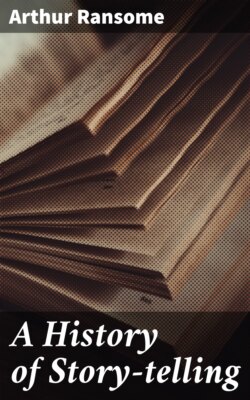Читать книгу A History of Story-telling - Arthur Ransome - Страница 8
На сайте Литреса книга снята с продажи.
'THE ROMANCE OF THE ROSE'
ОглавлениеTable of Contents
The thirteenth century.
Thinking of the Renaissance now, we are apt to see only the flowers of its spring, the work of men like Boccaccio and Chaucer, who were strong enough and aloof enough to lift their heads above the flood of classical learning that refreshed them, and to write as blithely as if there had been never a book in the world before them. It is easy to forget those dull years after Chaucer that showed how exceptional he had been in being at once a student and an artist. It is still easier to forget the winter years of ploughing and sowing and premature birth that were before him, the years when no one thought that poetry could be more esteemed than knowledge, those greedy years of rough and ready erudition between the making of the students' songs and the building of the Decameron. Many versions of old legends come to us from that time like the Life of Robert the Devil, whose son fought with Charlemagne. Many of the legends of the kind that the son of Mr. Bickerstaff's friend was such a proficient in, and many collections of miracles and small romances of chivalry less beautiful than that of Aucassin, were at least written down in these years. The monasteries held most of the learned men, and became more important than the minstrels in the history of story-telling. They produced the books of miracles, and also several armouries of warning examples, many of them taken from the classics, for the vanquishing of scrupulous sinners and the edification of all. Books like the Gesta Romanorum, volumes of tales more or less irrelevantly tagged with morals, were the forerunners of collections of less instructive stories, like those of Boccaccio's country-house party, or those of Chaucer's pilgrims riding to Canterbury. These books, with their frequent reference to antiquity, showed signs of the new spirit that was spreading over Europe; the miracle-tales and the exaggerated wondering biographies held the essence of the old. Rome in the former was the city built by Romulus and Remus; Rome in the latter was the place that had been rescued by Charlemagne, the place that was ruled by the Pope.
But in that thirteenth century, when so many new things were struggling to birth, one book stands out above all others as the most perfect illustration of its spirit. The very fact that it is so much less of a story than the anecdotes of the Gesta Romanorum had almost made me pass it over in a more detailed criticism of them, but this same fact perfects it as an example of an artist's attitude in the time of the revival of classical learning. It was almost an accident that let me see these years of novel study and eager wisdom so clearly expressed in the long rhyming narrative of the Romance of the Rose, that was known above all other books for a hundred years, that was read by Ronsard, modernised by Marot, and partly translated by Chaucer. The accident was such that I think there is no irrelevance in describing it.
Meung-sur-Loire.
Walking through France with the manuscript of my history on my back, I came at evening of an April day into the little grey French town of Meung, set on the side of a hill above the Loire. Small cobbled streets twisted this way and that, up and down, between the old houses, and walking under the gateway, the Porte d'Amont, with its low arch and narrow windows overhead, I felt I was stepping suddenly from the broad, practical France, whose roadside crucifixes are made of iron a hundred at a time, into a forgotten corner of that older France whose spirit clings about the new, like the breath of lavender in a room where it has once been kept. In the inn where I left my knapsack there was a miller who drank a bottle of wine with me, and talked of old Jean Clopinel, who was born here in Meung those centuries ago. 'And it was a big book he had the writing of too, and a wise book, so they tell me, and good poetry; but it's written in the old French that's not our language any longer; I could not read it if I tried, and why should I? They know all about it in the town.'
Indeed the town seemed a piece of the old French itself, with its partly ruined church, and the little château crowned with conical cap-like towers, the broad Loire flowing below. I thought of The Romance of the Rose, Jean Clopinel's book, the book that meant so much to the Middle Ages, the book that, unwieldy as it is, is still deliciously alive. I thought of Jean Clopinel and his description of himself, put as a prophecy into the mouth of the God of Love:—
